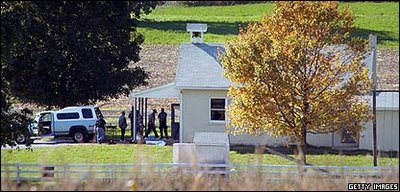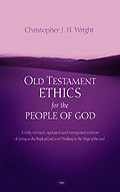
The tragic
Amish schoolhouse shooting provides us an interesting contrast and lesson. The attacker who was not Amish left behind a suicide note describing bitterness at events and loss suffered 20 years ago and an enduring anger at God. Yet as the close-knit
Amish community drew together to grieve over the horrors visited upon their community – 5 young girls died - one cannot help but be touched by their gentleness.
There’s a kind of otherworldliness in their response that is increasingly scarce in times like ours. Besides the usual soul-searching and painful fist shaking, the media reported that one thing that stood out in stark contrast was how the Amish families talked
“only in terms of forgiveness.” In another report, a researcher on Amish society noted that while the hurt was great,
“they don’t balance hurt with hate.”If forgiveness is sometimes not so easily asked (even for the contrite), it is even harder to offer especially to those who have done us violence. More so when it is inexcusable violence. The example of the Amish brings to mind the recent murder of Sister Leonella on the outset of Pope Benedict’s contentious remarks. The Italian nun who was shot to death outside a hospital in Somalia where she had served for 40 years whispered,
“I forgive, I forgive,” before she died.
Forgiveness is not a peripheral virtue reserved only for the saintly. Neither is it the reponse of the timid or fearful who have no recourse. It stands at the very center of Christian faith personified by Jesus who on the cross said
“Father, forgive them, for they do not know what they are doing.” His teachings to forgive those who sinned against us ‘seventy times seven’ (Luke 17:3,4) is a reminder that one ought continue to forgive as often as necessary in the same way that God Himself forgives the repentant. In our thin-skinned age, this same Jesus invites his followers to walk in his steps however personally grievous the circumstances may be. In fact the Bible carries grave warning against an unforgiving spirit, as those who do not forgive as God has forgiven them do so at the risk of their soul.
Missionary
Gladys Staines whose husband and two sons were burnt to death by a Hindu mob in 1999 displayed extraordinary restraint when she told the world she forgave their killers. I remember being moved to tears reading the news then. Mrs Staines returned to Orissa to continue her late husband's work among lepers and was recently awarded for distinguished services by the government of India. As all these remarkable individuals have shown, the way of Jesus is unequivocally the way of the cross.
John Piper’s
sermon on forgiveness, among other things, asked: when should one forgive another? He quoted Puritan Thomas Watson
(Body of Divinity),
“When we strive against all thoughts of revenge; when we will not do our enemies mischief, but wish well to them, grieve at their calamities, pray for them, seek reconciliation with them, and show ourselves ready on all occasions to relieve them.”
When you or a loved one has suffered offense or if someone has become your enemy in spite of all possible conciliatory efforts, the Bible sets out the following attitudes to adopt:
- Resist thoughts of revenge: Romans 12:19, "Never take your own revenge, beloved, but leave room for the wrath of God, for it is written, "Vengeance is Mine, I will repay," says the Lord."
- Don't seek to do them mischief: 1 Thessalonians 5:15, "See that no one repays another with evil for evil."
- Wish them well: Luke 6:28 "Bless those who curse you."
- Grieve at their calamities: Proverbs 24:17, "Do not rejoice when your enemy falls, and do not let your heart be glad when he stumbles."
- Pray for them: Matthew 5:44, "But I say to you, love your enemies, and pray for those who persecute you."
- Seek reconciliation with them: Romans 12:18, "If possible, so far as it depends on you, be at peace with all men."
- Be always willing to come to their relief: Exodus 23:4, "If you meet your enemy's ox or his donkey wandering away, you shall surely return it to him."
Piper is also careful to add that forgiveness is not the absence of anger at sin and neither is it feeling good about what was bad. It also does not mean the absence of serious consequences for sin. We merely leave the final judgment to God of whom the Bible records as saying, “Will not the Judge of all the earth do right?" (Gen 18:25). Finally, forgiveness must come from the heart as Jesus said in Matthew 18:35—"unless you forgive your brother from your heart" – or else it means nothing.
If all this seems idealistic, it is. C.S Lewis himself declared that everyone agrees forgiveness is a lovely thing - until we actually have to practice it. As Bruce Wayne found out much to his chagrin in Batman Begins, we are all defined by what we do - and not merely by what we know. Or think. Thankfully, Scripture also promises that God’s grace will equip us to go where human frailty causes us to falter. And that is good enough.
Link: Terry Mattingly - Amish have answers to violence



